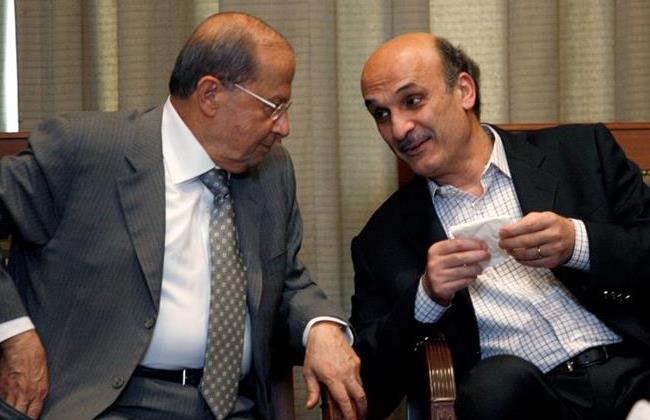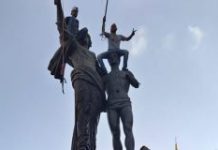Aoun, Geagea dispute a tough nut to crack
Hasan Lakkis/The Daily Star
Dec. 12, 2014
There has lately been daily activity by numerous delegations shuffling between the Free Patriotic Movement’s base in Rabieh and the Lebanese Forces’ headquarters in Maarab in order to find a solution to the presidential election file, according to parliamentary sources.
Both LF chief Samir Geagea and FPM leader Michel Aoun believe that the next president should be someone who represents Christians and wields a political and popular presence, the sources said.
However, the longtime dispute between the top two Maronite politicians is still preventing any sort of meeting between the leaders on the topic, especially since Geagea has rejected outright Aoun’s suggestion of restricting the candidacy list to just the two of them.
The Lebanese Forces’ suggestion is that all the parliamentary blocs attend a session for a presidential election, or else meet up independently and agree on a third person.
Geagea has confirmed, through the delegates, that he would be happy if any of the four main Maronite politicians are elected – himself, Aoun, Kataeb leader Amine Gemayel or Marada Movement chief Sleiman Frangieh – but that a figure of very high caliber should be chosen.
But the answer from Rabieh – Aoun’s residence – is still the same, according to political sources. The only possible solutions are to narrow the candidates down to two names and then hold a parliamentary session to vote on it, or give support to what Rabieh sees as the Maronite leader who has the biggest Christian bloc in Parliament – Aoun.
The only silver lining is that Aoun has expressed a willingness to negotiate, the parliamentary sources said. The FPM leader is still prepared to hold discussions, through mediators or delegates, in the hope of reaching a consensus that will eventually allow a face-to-face meeting between the two Christian leaders.
It is within this context that we should view the flurry of movement of international envoys, especially the French ambassador. They are aiming to elect a president other than the four candidates currently under consideration. And unlike Aoun and Geagea, the envoys do not think the future president has to be a strong figure that politically represents the majority of Christians, the sources said.
Still, a meeting between the two leaders is still a distant prospect that requires a U-turn in both leaders’ positions that will likely only be prompted by new local, regional or international considerations.
Bkirki’s role in this context is not important, the sources said, but Maronite Patriarch Beshara Rai is in communication with the envoys mediating on the issue.
“I have put so much effort toward reaching the point where the two [Aoun and Geagea] announced their readiness to meet,” former Minister Wadih Khazen told The Daily Star. “And these efforts received internal and external support, especially from the Vatican.”
“In my mediation, I didn’t touch on issues that the two would discuss in case they meet,” Khazen said. “But I think they’re in a tough situation and they no longer have many options except for meeting, communicating and discussing the file.”
A number of FPM deputies stressed that Aoun would welcome Geagea in Rabieh, but only based on a mutual understanding that only a strong Christian leader can be elected president.
These lawmakers are convinced that Aoun remains the most eligible candidate for the highest Christian post in the country.
The meeting could happen, they said, but the outcome is not certain.
The rivalry between the two dates back decades.
At the end of the Civil War, Geagea backed the Saudi-brokered Taif Accord to end fighting, while Aoun, then Army commander and head of a transitional military government, refused to recognize it.
A war broke out between the two leaders, dubbed a “war of elimination” by Geagea, that killed and wounded thousands and devastated much of the country’s Christian areas.
On May 18, 2005, the two came face to face when Aoun returned to Lebanon from his exile and subsequently went to visit Geagea in his prison cell in an attempt to turn the page on the past.
But after Geagea left prison, the disputes continued and gradually became more and more complicated, with each having backed different political alliances ever since.
















